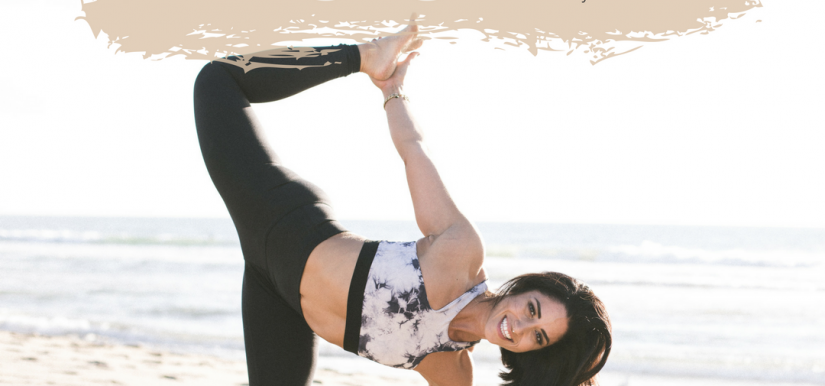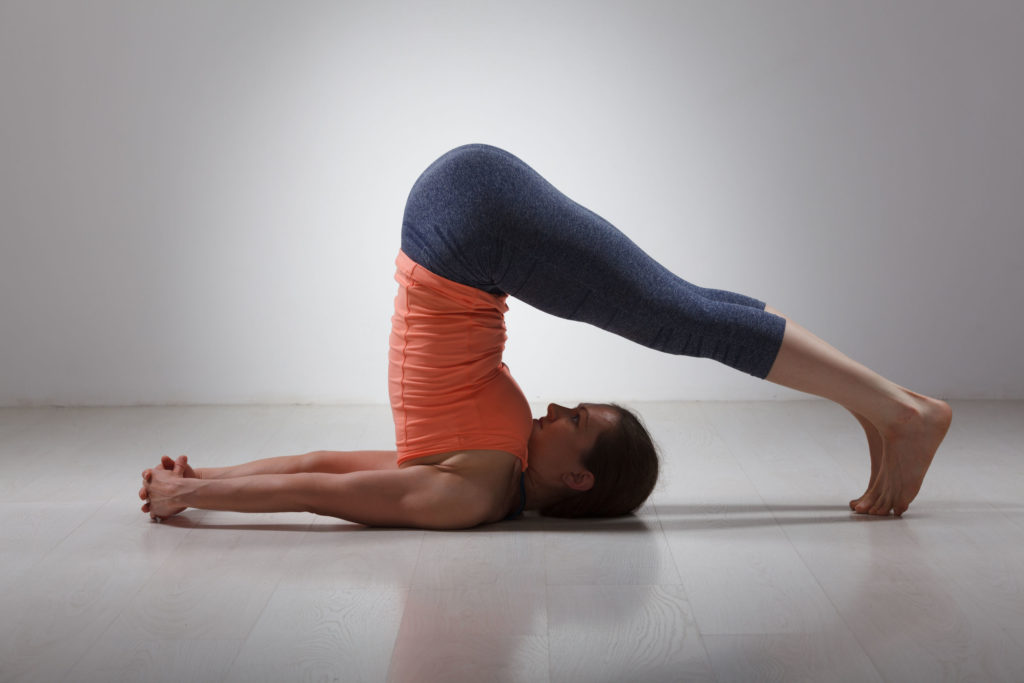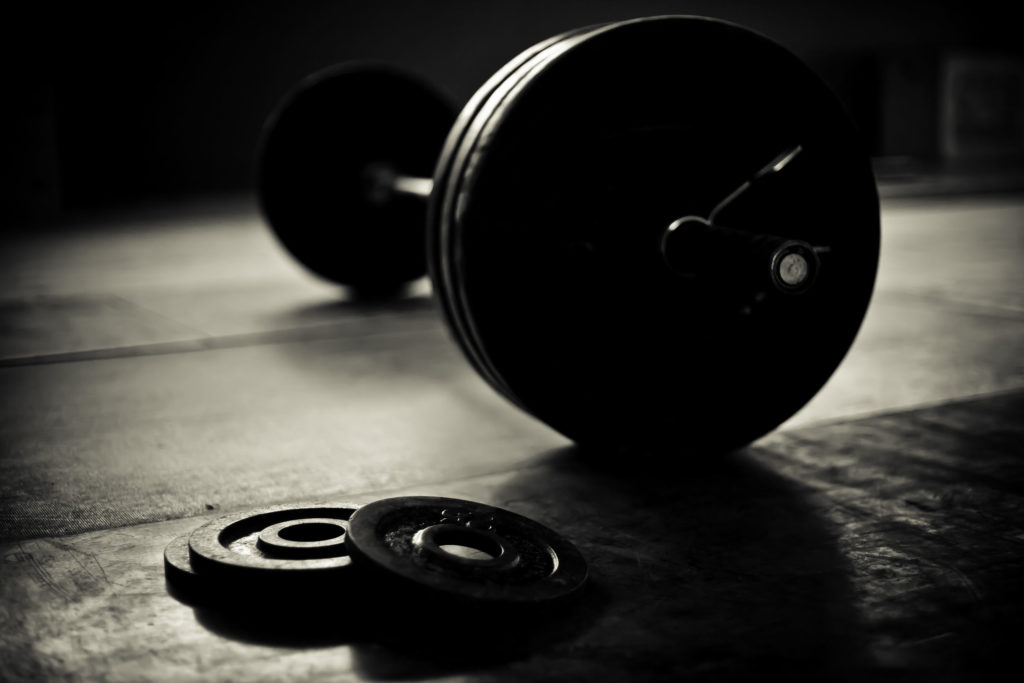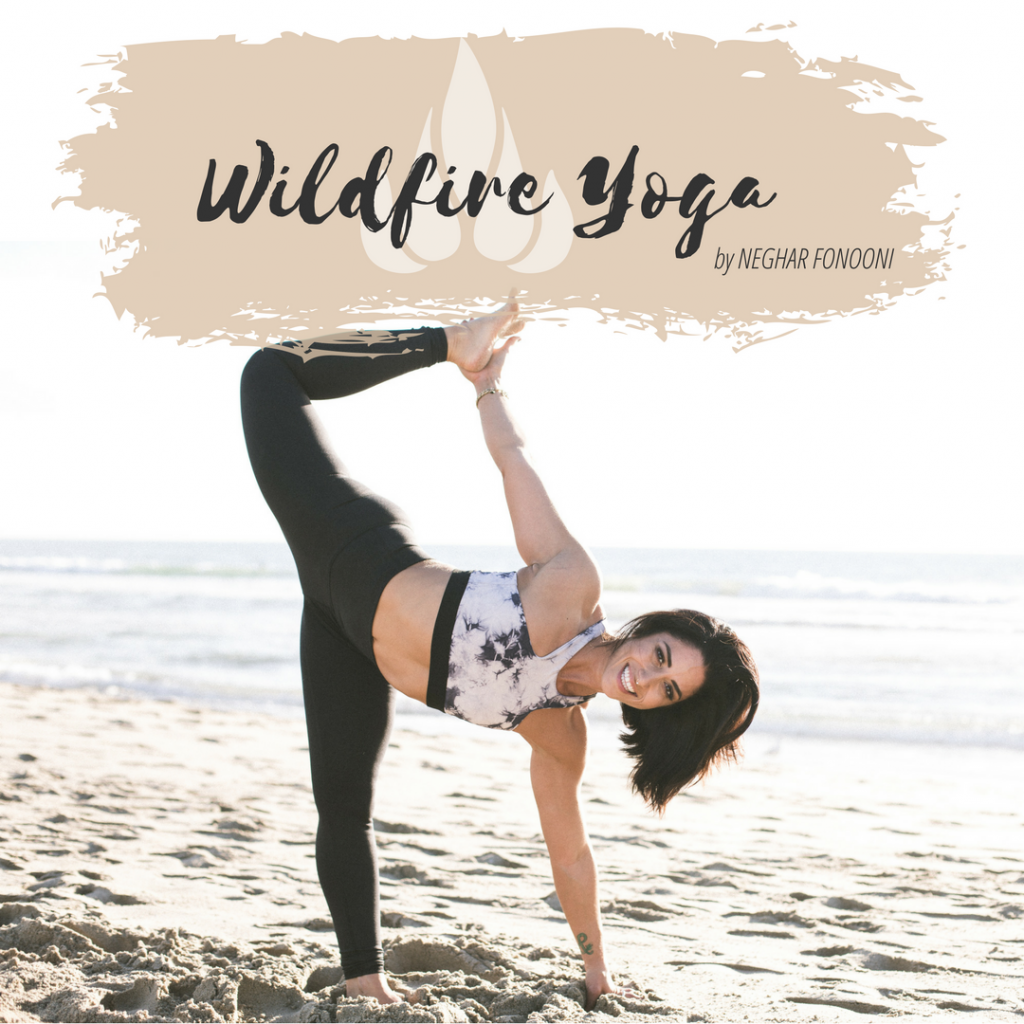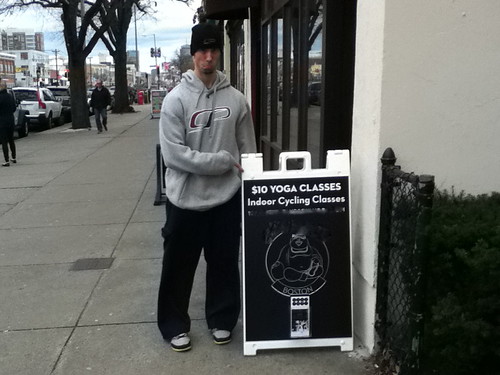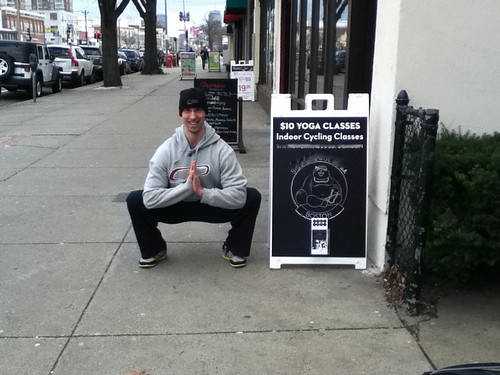I lift. You lift. We all lift. Raise your hand if you do yoga?
[Cue crickets chirping]
Chances are not many of you raised your hands. I can count on one hand the total number of times I’ve been to a yoga class. In fact, I wrote about taking one HERE.
It was okay, but it’s never been my cup of tea. Because, you know, yoga.

If only there was a style of yoga that was quick, not boring, and designed with meatheads in mind.
Egads, here comes Neghar Fonooni to the rescue.1She sent me a copy of her Wildfire Yoga resource last week and made sure to include this note (as if she knows me or something):
“I know what you’re thinking, yoga. But even meatheads can’t afford to not do this. This isn’t your standard yoga, but more along the lines of “flow series” that can be done in 5-20 minutes. The idea is to take the minimal effective dose and DO this shit.”
She had me at meathead.
Check it out HERE. But also read Neghar’s guest post below. If I can’t convince you she certainly can.
Yoga: For People Who Lift
The first time I stepped into a yoga class I was 18 years old. I’d been lifting weights for a few years as part of my high school sports requirements, and I had recently started working at the local YMCA—which meant I could try all of the classes free of charge.
And try them I did, which is how I ended up in this yoga class in the first place—the youngest, least flexible person in the room by a landslide. I remember watching these women, most of whom were 10-20 years my senior, get into positions I couldn’t even wrap my head around. It wasn’t so much that I wasn’t flexible, as I’d always stretched and mobilized while playing sports, but I sure wasn’t “yoga flexible” by any means.
Copyright: dimol / 123RF Stock Photo
It was during that extremely uncomfortable hour that I decided I couldn’t allow that physical discrepancy to stand. A competitive athlete all my life, I just couldn’t accept the notion that these “older” women could do something I couldn’t—which is absolutely comical when you consider that I sit here today in that age bracket I once considered old.
In response, I spent the next several years straddling both the lifting and yoga worlds, learning how to down dog and deadlift, and more than anything, learning how to be at home in my own body. At some point in my mid-twenties I officially became a meathead, chasing strength goals and worshipping barbells—and in that process, I lost touch with my yoga practice.
I was training 1-2 hours a day, and I just couldn’t find the time for yoga practices. Not to mention, I’d gotten so into lifting that yoga began to feel…superfluous. Unimportant, even. It wasn’t until a few years later, while seeking emotionally and mental balance, did I realize what a disservice I’d done myself by abandoning my yoga practice.
Sure, deadlifts and squats were great—but something was missing.
I’d gotten so serious about training to the extent that I’d actually lost touch with my body. It became a tool to lift things up and pick them down, and as a result, I often felt like a stranger in my own skin.
It didn’t take long for me to figure out that yoga was the missing link. But, having completely immersed myself into the meathead world, I simply didn’t have the time to dedicate to a yoga practice. Not to mention, I’d gained a lot of muscle in my yoga off-season, making it a little trickier to get into some of those poses.
I found myself uncomfortable and intimidated in most of the yoga classes I attended, not having a typical “yoga body” and finding resistance in certain poses due to my delts of doom and my Quadzilla legs. I also found that during 60-90 minute yoga classes I would get bored, distracted, and even anxious.
I wasn’t really a yogi, at least not like the yogis I saw around me. But I knew I wasn’t only a meathead either, because yoga felt like something I needed in my life. I was, in fact, a meathead yogi—the most flexible person at my gym, yet the least flexible in my yoga class.
I had a unique perspective in this role, one that allowed me to see the beautifully inverse relationship between the two practices. But I couldn’t balance them with my schedule—at least not completely. I was a single mom, a full time personal trainer, and a blogger—all while taking night classes to finish my degree. I didn’t have time for 60-90 minute yoga classes, but I could carve out space for the minimal effective dose.
We talk about this a lot as it pertains to strength training; we know that we don’t necessarily have to dedicate hours in the gym in order to get strong, and that by being consistent with a minimal effective dose, we can make major strides.
Copyright: jtrillol / 123RF Stock Photo
We know that a 20 minute workout is better than no workout at all, and we know that by giving ourselves permission to do these shorter workouts, we’re more likely to build momentum when it comes to our training.
In contemplating this lesson I’d spent years teaching my clients, I realized that, just as I could get a lot out of a 20 minute training session, I could really benefit from just 5-10 minutes of yoga as well. Was a 60 minute yoga class going to be effective? Absolutely. But I didn’t have that kind of time, and I knew that I couldn’t afford not to do yoga.
I was spending so much time in the gym, lifting heavy weights, doing serious, strenuous movements, and I had nothing to balance me out. I was all yin and no yang, all hustle and no flow. But once I gave myself permission to do the bare minimum with regards to yoga, everything changed.
I started spending 5 minutes per day on my mat, and that 5 minutes eventually increased to 10, then 15, then twenty. Today I fluctuate between 5 minute morning flows and 20-30 minute flows on Sunday. I still consider myself a yogi but I rarely make it to a yoga studio. And despite that fact, I enjoy the myriad benefits that come with a yoga practice.
If you’re anything like me, you love to deadlift too. You probably like to squat, maybe even bench. Me? Pull-ups are my absolute favorite. And by doing just a few minutes of yoga per day, I’ve improved all of those lifts. My lifting regimen has benefited immeasurably from the addition of a short yoga practice, and in ways I’d never even imagined.
Here’s how…
More Active Recovery
Yoga is an effective and low impact way to move on your non-lifting days without compromising recovery. Rather than take a full day “off,” you can keep your movement momentum going every single day by doing just a few minutes of yoga.
Plus, if you’re feeling sore from a particularly intense training session, a short yoga flow can help redistribute blood flow and in recovery. If you could help your body recover in just 5-10 minutes per day so that you felt better going into your next training session, wouldn’t you say that’s a no-brainer?
Kinesthetic (Body) Awareness
Flowing through poses while barefoot and without a mirror requires a great deal of control. Yoga requires you to listen to your body, tapping into your trunk, your feet, your legs, and your hands to enter and sustain postures without visual aid.
This process increases kinesthetic (or body) awareness and can help when moving through compound lifts at the gym such as squats and pushups. Because yoga carries such an internal focus, it can encourage you to practice more intuition during your lifts.
Balance
And I don’t mean stability, although you’ll certainly get your fair share of that from yoga. I’m referring to the balance of activity that yoga provides to meatheads like us. Lifting sessions are typically aggressive and weighted, while yoga is intrinsic and uses the body as leverage. This can create a balance between Herculean and Buddha-like activities, which in turn, encourages balance within your daily life.
If you’re anything like me, you find that you’re more hustle than flow—yoga helps you add more flow into your life, which actually benefits your hustle.
Mobility and Flexibility
No matter how many times someone tells us that we need to spend more time stretching our muscles or mobilizing our joints, we would just rather lift, wouldn’t we?
I mean, who has time to do all that flexibility work when we have to make sure we snag that open rack for a squat sesh? But, improving your mobility and flexibility will increase your movement efficiency-benefiting your lifts exponentially.
Yoga is a fun way to get bendy that won’t take up valuable gym time. By doing 5-8 minutes of yoga every day, you’re building a foundation of mobility that doesn’t require you to do lengthy warm-ups at the gym, or add time to your already time-consuming lifting sessions.
Breath Control
I cannot tell you how many times I have helped someone out of shoulder pain by teaching them to breathe from their diaphragm or coached a client into a stronger overhead press just by cueing them to BREATHE. Yoga places significant emphasis on the breath, which will keep you aware of your breathing during your training sessions.
Note from TG: while not quite the same thing (it’s close) here’s me explaining what it means to get 3D expansion of rib cage which is all about keeping diaphragm and pelvis aligned for optimal stability.
The Goldilocks Principle
Understanding when to hold back on your lifts and when to push through is a delicate dance.
You can sometimes set down the weight and think, “I could’ve done more.” Inversely, you might be wishing you hadn’t pushed through that last ugly rep. Yoga teaches you how to feel free within your body, accomplishing challenging poses while fostering ease of movement.
You can’t force the poses if you intend to do them correctly, but you are encouraged to work with the body you have in that moment, and access what abilities you can find. It’s a beautiful balance of just right that can aid you in your lifting endeavors.
Bodyweight Strength
When I started bringing yoga back into my life, I realized that my strength training had some critical holes in it. Being able to move heavy iron relative to your bodyweight is awesome, but then discovering that you have little ability to leverage that bodyweight? Well, that was a revelation.Yoga improves bodyweight strength, and puts you in positions that you might not otherwise put yourself in at the gym.
Noncompetitive Environment
Most of us who lift regularly have an inherent competitive nature. We compete with ourselves to set PRs, compete with friends at the gym, or even compete in an organized environment such as powerlifting, CrossFit games, or sporting events.
This is a personality trait I see in most of my gym buddies, and it’s something that can certainly benefit us. However, even when this competition is friendly, it’s still competition and can sometimes blind us.
Yoga is a noncompetitive environment that can bring you back to your center when your hunger for big lifts gets ravenous. You’ll have to learn to accept your progressions and avoid comparing yourself to others.
There is no “PR” in yoga, just a commitment to show up on the mat and move.
Bigger Lifts
You might not typically think of yoga as something that can make you stronger, but it sneaks up on you like that. Yoga poses can translate to lifting strength by waking up muscles you don’t often use, encouraging cooperative multi-joint movements and giving you wicked upper body strength. I can deadlift over twice my bodyweight and perform multiple sets of 10 pull-ups-but there are yoga poses that absolutely humble me.
With all of these amazing benefits, you cannot afford not to do yoga. Give yourself a few minutes on the mat per day, and I guarantee your training—and your quality of life—will improve drastically.
Wildfire Yoga
Can you get all of these benefits in just 5 minutes a day? Of course you can! Chances are you’re not doing any yoga right now. You’ve decided it’s not for you because:
- It takes too long
- You’re not good at it
- Yoga studios are not your jam
- You don’t want to spend money on classes
- You’d rather lift
And I get it, trust me. I can totally relate to all of those things. But what if I told you that you could use the minimal effective dose of yoga to get you all of these benefits and more?
Enter Wildfire, the 21-day yoga program designed for people who would rather lift…

